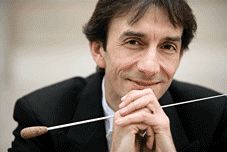
One of the challenges of performing Beethoven’s Ninth is figuring out what to program during the first half. The Ninth runs more than an hour, so the usual overture and concerto make for an extended evening. The solution here was to avail the symphony of the choir and perform Stravinsky’s Symphony of Psalms. At 20 minutes, it’s short enough to whet the appetite without tiring the ear.
Sadly, the Stravinsky proved no match for the subsequent Beethoven. The reduced orchestra, with woodwinds in place of violins, produced a thin sound, and the 50-voice Sonoma County Bach Choir, hampered by the dry acoustic, never achieved the resonant tones it produces in its usual liturgical venues. (Full, happy disclosure: I sometimes sing in the Bach Choir.)
The performance did perk up a bit in the third movement, with the choir’s strong Alleluias and Laudates. Ferrandis, mouthing the words, exhorted more from the assemblage, yet it was all over too quickly for the music to take off.
The liftoff occurred in the second half, beginning with a long countdown during which the Bach Choir, the Santa Rosa Symphonic Chorus, and the Montgomery High School Chamber Singers — about 150 in all — filed on stage. There were enough singers to account for most of the full house, assuming each singer brought one or more friends or relatives.
The singers stood shoulder to shoulder at the back of the stage and then seated themselves, with much bending of knees, to await their turn in the fourth movement. Meanwhile, the soloists were notably absent, perhaps out of fear that they would divert attention from the orchestra.
Podium to Ludwig: “Lifting Off ...”
When that ensemble finally began to play, ignition was immediate. The opening two-note figure was both mysterious and evocative, giving way to a blistering tempo under Ferrandis’ strict control. His movements have become more spare during his tenure in Santa Rosa, even as his command of the orchestra has grown more acute.Ferrandis made the architecture of this architectural symphony readily apparent. Each line was distinct, even crystalline. The string sound, in particular, was short and punchy, with little sustain. That style of play was well-suited to the hurtling speed emanating from the podium, where Ferrandis’ foot seemed to have pegged the accelerator to the floor.
The scattered applause at the conclusion of the first movement quickly gave way to the crisp attack and even more rapid rate of the Molto vivace second movement. Someone near me started to moan, perhaps from heart fibrillations. I began to wonder if Ferrandis was giving the music enough room to breathe, but I soon succumbed to the compelling logic of 1-2-1-2, with octaves in the strings to reinforce the point.
After yet more applause, the soloists made their way onto the stage, and Ferrandis began the Adagio third movement. Here the up-tempo rendition worked against the music, which cries out for a more luxuriant, resonant approach. The continuing short, punchy bow strokes of the violins seemed out of place, while the winds were sometimes ragged.
No matter. The fourth movement started magisterially and got better from there. The cellos and basses were magnificent, their low tones projecting outward, their rhythm secure. The viola and bassoon duet was equally good, and the violin entry was thrilling.
Just as I began to wonder what could top all that exquisite playing, baritone Joseph Wiggett intoned, “O Freunde, nicht diese Töne!” (O friends, not these sounds!). Wiggett possesses a marvelous voice, with excellent German diction and an orotund sound. On cue, the assembled choirs rang out, “Freude!” (Joy!), benefiting greatly from their increased number.
The rest of the symphony was electrifying. The chorus blended seamlessly with the orchestra, as did the soloists. The final vocal quartet was a model of balanced ensemble, with each voice clearly audible.
The real star, however, was Ferrandis himself, who kept a tight grip on all the proceedings. I have rarely seen his musicians play so intently, or so well. Their fingers were really flying, and they kept hurtling through space right until the last note.

